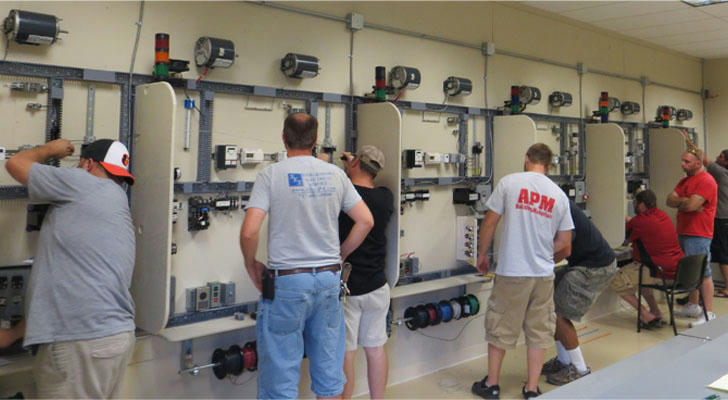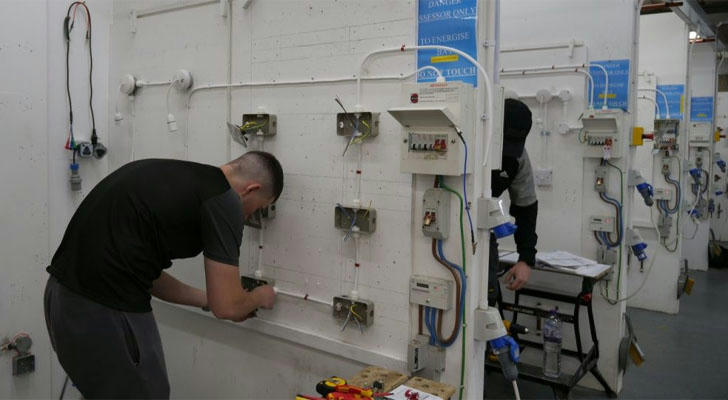US Electrical Installation Training: No Experience? No Problem! Start Your Lucrative Career Here 💡
Are you looking for a high-paying career with excellent growth potential but worried about lacking experience? The electrical installation industry might be your perfect match! With the right training programs, you can kickstart a lucrative career in electrical installation even with no prior experience. According to the Bureau of Labor Statistics, employment of electricians is projected to grow 28% from 2022 to 2032, much faster than the average for all occupations. This demand creates ample opportunities for newcomers to enter the field. If you're eager to learn and build a stable future, now is the perfect time to explore electrical installation training programs.

Promising Career Prospects and Advantages
The electrical installation field offers a range of career paths with competitive salaries. As an electrician, you can specialize in various areas such as residential, commercial, or industrial electrical work. The median annual wage for electricians was $98,440 in May 2023, with some experienced professionals earning over $100,000 annually. Additionally, electricians often receive benefits like health insurance, retirement plans, and paid time off. The job outlook is also promising, with consistent demand for electrical services in both new constructions and maintenance projects.
Training Programs for Beginners
Many training programs are designed specifically for individuals with no prior experience. For example, the NTI school offers an electrical technician training program that can prepare you for job readiness in just three months. These programs combine classroom learning with hands-on practical training, ensuring you gain both theoretical knowledge and real-world skills. They cover essential topics such as electrical theory, safety procedures, and industry standards. Plus, some programs even provide job placement assistance to help you transition smoothly into the workforce.
The Electrical Training ALLIANCE also offers comprehensive apprenticeship programs. Their courses include electrical systems technology and maintenance electrician training. These programs typically last three to four years and combine online learning with in-person labs and on-the-job training. Upon completion, you'll be well-equipped to pass certification exams and start your career as a qualified electrician.
Career Paths and Specializations
The electrical trade offers diverse career paths to suit different interests and goals.
Residential Electrician
Install and maintain electrical systems in homes and apartments. Your responsibilities include wiring, lighting installation, and troubleshooting electrical issues. You'll typically work in residential settings and may also handle outdoor lighting systems.
Commercial Electrician
Focus on electrical installations in commercial buildings. This role involves working on construction sites to set up wiring, security systems, and other electrical infrastructure. Commercial electricians play a crucial role in ensuring buildings meet safety and functionality standards.
Maintenance Electrician
Specialize in troubleshooting and repairing malfunctioning electrical equipment. You might work in various settings, from homes to industrial complexes, ensuring electrical systems operate smoothly and safely.
Industrial Electrician
Work in factories, manufacturing plants, and other industrial settings. Your tasks may include installing and maintaining heavy machinery, power systems, and control panels. This specialization often requires additional certifications and offers higher earning potential.
Success Stories
Many individuals have successfully launched careers in electrical installation through apprenticeship programs. For instance, John started as an apprentice with no prior experience and is now a journeyman electrician earning a competitive salary. "The apprenticeship program gave me the skills and confidence I needed to succeed. I'm grateful for the opportunity to build a rewarding career in this field," says John. Another success story is Sarah, who transitioned from a different career to become a residential electrician. She now enjoys job stability and the ability to work independently while maintaining a good work-life balance.

How to Get Started
If you're ready to begin your journey into electrical installation, here are some actionable steps:
Research Training Programs
Look for reputable training programs in your area or online. Consider factors like program duration, curriculum, and job placement rates. Some well-known programs include those offered by the Electrical Training ALLIANCE and NTI school.
Meet Prerequisites
Most programs require a high school diploma or equivalent. Some may also require basic math and science knowledge, which can be acquired through preparatory courses if needed.
Apply for Apprenticeships
Reach out to local trade unions, contractors, or vocational schools to inquire about apprenticeship opportunities. Prepare a strong resume highlighting your willingness to learn and any relevant skills.
Gain Licensing and Certification
After completing your training, obtain the necessary licenses and certifications required in your state. Licensing requirements vary but often involve passing an exam demonstrating your knowledge of electrical codes and safety practices.

Conclusion
Starting a career in electrical installation with no experience is entirely feasible through the right training and apprenticeship programs. The field offers competitive salaries, excellent job growth, and diverse career paths. By following the steps outlined above and committing to learning, you can build a stable and rewarding career in electrical installation. Take the first step today and explore the opportunities waiting for you in this dynamic industry. Your journey to a lucrative career begins now!
